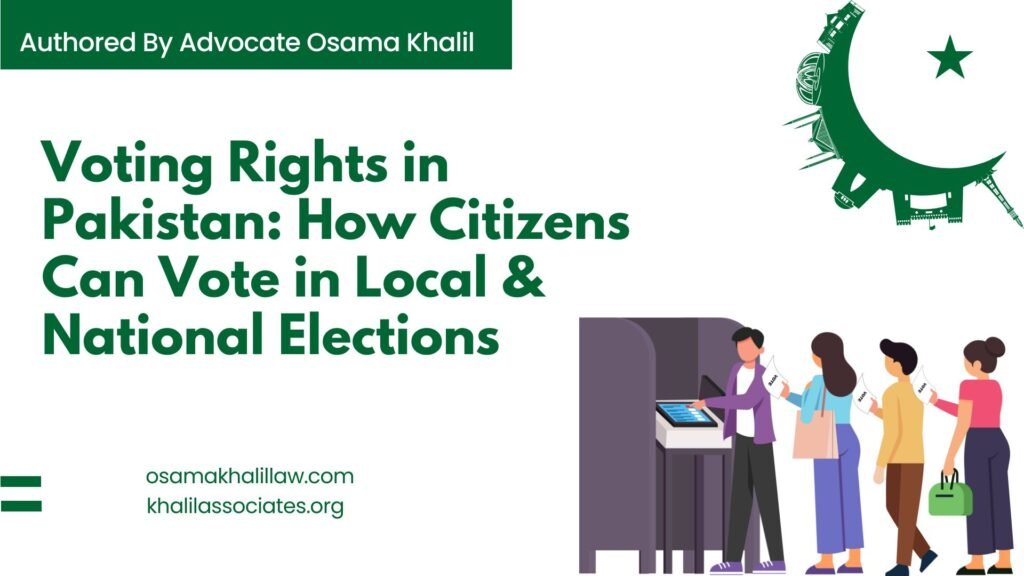
Voting rights in Pakistan give every eligible citizen the power to choose their leaders. The government ensures that people can vote in local and national elections. These rights help shape the country’s future by allowing citizens to elect representatives who make laws and decisions.
Who Can Vote in Pakistan?
The Pakistani constitution grants the right to vote in Pakistan to all citizens aged 18 or above. The Election Commission of Pakistan (ECP) manages voter lists and ensures fair elections. If you are a Pakistani citizen and meet the age requirement, you can register to vote.
How to Register as a Voter in Pakistan?
To use your voting rights in Pakistan, you must first register. The process is simple:
- Visit the ECP’s official website or a local registration office.
- Provide your CNIC (Computerized National Identity Card) details.
- Verify your information and get your name added to the voter list.
Once registered, you can participate in both local and national elections.
Types of Elections in Pakistan
Pakistan holds two main types of elections where citizens use their right to vote in Pakistan:
- National Elections: These include voting for the National Assembly and Provincial Assemblies.
- Local Elections: These involve electing local government representatives like mayors and councilors.
Both elections play a crucial role in democracy.
Why Is Voting Important in Pakistan?
Voting is not just a right to vote in Pakistan but also a responsibility. When citizens vote, they help decide who will make laws, manage resources, and represent their interests. Strong voter turnout leads to better governance and a stronger democracy.
How to Check Your Voter Registration Status?
The ECP allows voters to check their registration status online. You can visit the ECP website, enter your CNIC number, and see if your name is on the voter list. If not, you must register immediately to use your voting rights in Pakistan.
What Documents Do You Need to Vote?
On election day, you must bring your original CNIC to the polling station. Without it, you cannot vote. The ECP strictly follows this rule to prevent fraud and ensure only eligible citizens exercise their Pakistani voting laws.
Where and When Can You Vote?
The ECP announces election dates and polling stations beforehand. You can find your assigned polling station on your voter slip or the ECP website. Polling usually starts early in the morning and continues until evening.
What Happens If You Don’t Vote?
While voting is a right to vote in Pakistan, it is not compulsory. However, if citizens do not vote, they lose the chance to influence government decisions. Low voter turnout can lead to unrepresentative leadership.
How Does the Voting Process Work?
On election day, follow these steps to use your voting rights in Pakistan:
Go to your designated polling station.
Show your CNIC to the polling officer.
Receive your ballot paper.
Mark your preferred candidate in secret.
Put the ballot in the voting box.
The ECP counts all votes and announces results transparently.
Common Challenges in Voting
Some citizens face issues like incorrect voter lists or far-away polling stations. The ECP works to fix these problems, but voters should verify their details early to avoid last-minute problems with their election voting process in Pakistan.
How to Report Election Fraud?
If you see any fraud or irregularities, report them to the ECP or polling agents. Protecting the fairness of elections ensures that citizen voting rights Pakistan remain strong.
Final Thoughts on Voting Rights in Pakistan
Every Pakistani citizen must understand and use their voting rights in Pakistan. Voting shapes the country’s future, and every vote matters. Register today, participate in elections, and help build a better Pakistan.
By exercising your right to vote in Pakistan, you contribute to democracy and ensure your voice is heard in local and national decisions.
Legal Assistance for Citizenship Matters
For professional legal guidance and support in immigration matters, you may contact:
Mr. Osama Khalil
Lawyer & Legal Consultant
📞 Phone: 0316-1829946
📧 Email: contact@osamakhalillaw.com | contact@khalilassociates.org
